|
|
|
Sort Order |
|
|
|
Items / Page
|
|
|
|
|
|
|
| Srl | Item |
| 1 |
ID:
104990
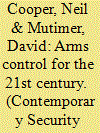

|
|
|
|
|
| Publication |
2011.
|
| Summary/Abstract |
In the past two decades there has been an extensive reconceptualization of security and its associated practices, but there has been scant attention to questions of arms and their control. This article, and those which follow, seek to start a conversation about the control of the means of violence. We begin by drawing on the metaphor of arms control as science fiction in order to highlight notable features of the classical arms control literature. The article then discusses the ways contemporary arms control practice has evolved from a Cold War focus on parity and mutual vulnerability to a global control architecture characterized by the pursuit of absolute security via an ever-expanding range of non-proliferation initiatives aimed at rogues, rebels and terrorists. Consequently, in its post-Cold War, post-9/11 mode, contemporary arms control practice has been transformed into a form of global counter-insurgency. We suggest that the term controlling the means of violence (CMV) better captures the wide range of control initiatives that can be deployed to limit the instruments of armed violence. Finally, we summarize the arguments set out in the rest of the special issue and outline the future directions for research and activism suggested both by the papers collected in this volume and the broader discussions in the conferences that gave rise to them.
|
|
|
|
|
|
|
|
|
|
|
|
|
|
|
|
| 2 |
ID:
104995
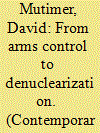

|
|
|
|
|
| Publication |
2011.
|
| Summary/Abstract |
On 5 April 2009, US President Barack Obama spoke in the Czech Republic, and the speech included the following quite extraordinary pledge: 'So today, I state clearly and with conviction America's commitment to seek the peace and security of a world without nuclear weapons.' Obama renewed the commitment the United States had first made formally by ratifying the Nuclear Non-Proliferation Treaty, to work towards nuclear disarmament, and went further to indicate that the means he would use to reach that goal, in the first instance, would be bilateral arms control negotiations. This article explores the relationship between the practice of negotiated, bilateral, nuclear arms control, and the goal Obama has so clearly set of reaching a world without nuclear weapons. It argues that arms control, understood as a social practice, is ill-suited to the pursuit of nuclear disarmament; that while arms control can produce limits and even reductions in nuclear weapons, it works against the overall elimination of arms. It then sets the practice of bilateral nuclear arms control in the context of the governmental rationality, or governmentality, elaborated by Michel Foucault to argue that nuclear arms control is a governmental technology, rooted much deeper than simply a Cold War diplomatic practice. From there, the article shows that the initial products of Obama's pledge, notably the New START Treaty are another instance of this governmental practice, before concluding with some thoughts on the way towards denuclearisation without passing through Cold War arms control.
|
|
|
|
|
|
|
|
|
|
|
|
|
|
|
|
| 3 |
ID:
134382
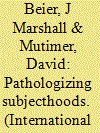

|
|
|
|
|
| Summary/Abstract |
Beginning with a recurrent discussion about the choice between two imagined Star Trek technologies, the holodeck and the transporter, this article explores how popular culture can be revealing of ways in which political possibilities are variously made and foreclosed by dint of deeply held but underinterrogated ideational commitments circulating in the mundane and carried forward by what might seem unlikely voices. Tracing a few such commitments as they pertain to the legitimation and delegitimation of political subjecthood, we examine the political stakes of questions of agency and delusion through what were initially reported to have been the June 2006 suicides of three detainees at the US base at Guantanamo Bay, Cuba, and the crisis that emerged with respect to multiple hunger strikes at that same facility some seven years later. Through these we ask whether there might be resistance-enabling possibilities as yet unimagined in agential choices that can so deeply offend prevailing sensibilities that it is sometimes difficult to abide them as valid choices at all. As we struggle with these resurgent security politics, it might seem frivolous to turn to film and television, or pub games at conferences, for guidance. What this article demonstrates is that these popular renderings of the limits of acceptable subjectivity draw on deep currents in our very broadest culture. In a very real sense, we are all very well prepared for our present political rendition.
|
|
|
|
|
|
|
|
|
|
|
|
|
|
|
|
| 4 |
ID:
072625
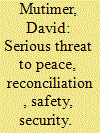

|
|
|
|
|
| Publication |
2006.
|
| Summary/Abstract |
Evaluations of the 2001 Conference on the illicit trade in Small Arms and Light Weapons and the Programme of Action (PoA) which it produced cover the gamut from success to failure. This essay does not seek to explain the success or failure of the Conference, nor does it look forward to the 2006 Conference and beyond to see what possibilities there are for global public policy on SALW. It is concerned, rather, with the topography of the issue which will come to the table in 2006. By means of Michel Foucault's notion of 'effective history', the essay investigates the problem that the PoA has produced. It shows how that problem is constituted around two key features: small arms and light weapons as a particular category of technology, and the division between the licit and illicit trade. It demonstrates both the contingency of this framing and the effects that it has produced. In particular, it shows how this framing makes possible a set of 'proliferation control' practices similar to those applied to other forms of military technology, and how it masks forms of gun violence, particularly those directed against women.
|
|
|
|
|
|
|
|
|
|
|
|
|
|
|
|
| 5 |
ID:
089481
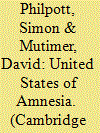

|
|
|
|
|
| Publication |
2009.
|
| Summary/Abstract |
This article interrogates the ways in which the United States 'forgets' the consequences and effects of its foreign policy in the making of its identity. In particular, the article argues that such forgetting enables the United States government to frame its interventions in world affairs as innocent and morally driven. Literature on collective memory and the forgetting that enables the production of such memory informs one element of the argument. Three contemporary films from the amnesia genre are analysed to provide insights into the kind of American identity forged in the acts of remembering and forgetting, illustrating the argument that remembering and forgetting are complex, voluntary and at times mendacious processes. The article concludes with the observation that the processes of forgetting past action when framing the context of new interventions make the United States a dangerous force in global affairs.
|
|
|
|
|
|
|
|
|
|
|
|
|
|
|
|
| 6 |
ID:
048087
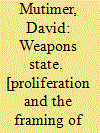

|
|
|
|
|
| Publication |
Colorado, Lynne Rienner Publishers, 2000.
|
| Description |
xii, 221p.
|
| Standard Number |
15558877877
|
|
|
|
|
|
|
|
|
|
|
|
Copies: C:1/I:0,R:0,Q:0
Circulation
| Accession# | Call# | Current Location | Status | Policy | Location |
| 042419 | 355.825119/MUT 042419 | Main | On Shelf | General | |
|
|
|
|
| 7 |
ID:
051116
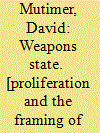

|
|
|
|
|
| Publication |
Boulder, Lynne Rienner Publishers, 2000.
|
| Description |
xii, 221p.
|
| Standard Number |
1555877877
|
|
|
|
|
|
|
|
|
|
|
|
Copies: C:1/I:0,R:0,Q:0
Circulation
| Accession# | Call# | Current Location | Status | Policy | Location |
| 042853 | 355.825119/MUT 042853 | Main | On Shelf | General | |
|
|
|
|
| 8 |
ID:
137129
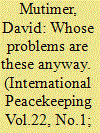

|
|
|
|
|
| Summary/Abstract |
It has been more than 30 years since Robert Cox introduced the distinction between problem solving and critical theory to the study of international relations.1 To remind us, Cox took problem-solving theory to be that which ‘takes the world as it finds it, with the prevailing social and power relationships into which they are organized, as the given framework for action. The general aim of problem-solving is to make these relationships and institutions work more smoothly by dealing effectively with particular sources of trouble.’2 There is nothing necessarily wrong with solving problems, but it does tend to mask the ‘larger picture of the whole of which the initially contemplated part is just one component’, which critical theory leads us towards.3 I was reminded of Cox's work in reading Roland Paris’ analysis of the structural problems of R2P, because it is a masterful example of problem solving at its best, which at the same time begs us to take Cox's critical turn and look to the larger structures of which R2P and humanitarian intervention more particularly are a part.4 I would argue that the five structural problems Paris identifies are not features of humanitarian intervention, but rather of these larger structures within which the practice of intervention is embedded. In this short intervention I will defend this assertion, and then consider what difference it might make.
|
|
|
|
|
|
|
|
|
|
|
|
|
|
|
|
|
|
|
|
|